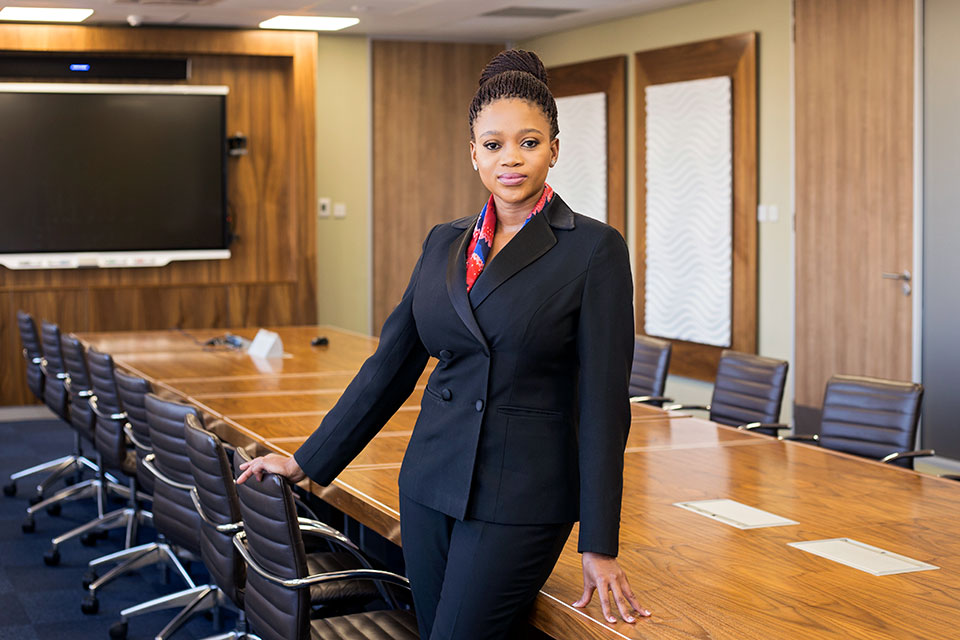I am Generation Equality: Bogolo Joy Kenewendo, economist, gender and youth activist
Billions of people across the world stand on the right side of history every day. They speak up, take a stand, mobilize, and take big and small actions to advance women’s rights. This is Generation Equality.Date:


I am Generation Equality because
“We all deserve equal opportunity. Opportunity creates better livelihoods and opens up a world of possibilities for all.
Three things you can do to become part of Generation Equality
- Understand that building a better world is everyone’s responsibility and start in your own corner.
- Feed your passion. Get going and the world will catch up, it always does.
- Find a mentor.
I find it problematic that, even in 2021, we still need to justify why women can and should be leaders. We have to climb a steep hill just to have a seat at the table, to have agency, and to participate in and contribute to economic development.
A lot of work has been done since the 1995 Beijing Declaration and Platform for Action. Why should I now, 26 years later, still have to justify my position in leadership?
I know that we have to continue speaking to women’s participation in leadership, but I want us to also really start challenging [the status quo].
Tackling the multidimensionality of poverty
I am passionate about trying to figure out how to reduce poverty and inequality. I think it’s because I come from one of the poorest areas in Botswana. Poverty is one of the most urgent issues of our time. It cuts across everything, including climate change, gender equity and the digital divide – the haves and have-nots in ICT.
We need to close that digital divide to ensure that the poorer aren’t getting poorer and being further alienated from mainstream economies. For example, under COVID-19 lockdowns, children with access to computers are able to continue learning and progressing. Those without, aren’t. How do we close that digital divide to ensure that all children have similar opportunities in life?
COVID-19 has lifted the veil on development challenges that had been swept under the rug for so long, and shown us that vulnerable groups are a lot more vulnerable than we thought they were or had been presented to be. The African Development Bank said that about 30 million Africans were pushed back into extreme poverty in 2020 as a result of the pandemic. That means they never left. The goal shouldn’t be to get people off the poverty line and remain vulnerable, it should be to push them a lot further.
COVID-19 presents an opportunity for the world; how we move forward will determine the length and depth of the impact of the economic crisis.
Uplift others to uplift yourself
We started the Molaya Kgosi Trust in 2011 to provide mentorship opportunities for young girls in rural areas.
“Building a better world is everyone’s responsibility.”
Given the adverse impact of COVID-19 on our tourism sector, one of the largest employers in Botswana, we recently adopted 25 students in the north, where tourism is the mainstay and parents are struggling. We want to ensure that they have basic necessities, help them get through senior school and see them go to university. Some of them will be the first ones to go to university in their families. That would open up a whole new world, not just for them, but for their families and communities.
Building a better world is everyone’s responsibility. Equity does not take away from anybody. I encourage everyone to be an ally and to stop asking questions that reflect [outdated] negative stereotypes about women’s rights. What we say guides what happens around us.
Everyone should be a women’s rights activist or an ally because, as cliché as it may sound, when a woman is empowered, she raises the whole society and community. Wouldn’t it be nice for all of us to be uplifted?”
Bogolo Joy Kenewendo, 33, is an African Economist, a Non-Resident Fellow with the Center for Global Development, Managing Director of Kenewendo Advisory, Co-Founder and Chairperson of the Molaya Kgosi Trust, and the former Minister of Investment, Trade and Industry in Botswana. She is also a member of the G7 Gender Equality Advisory Council, and United Nations Secretary-General’s High-Level Panel on Digital Cooperation.